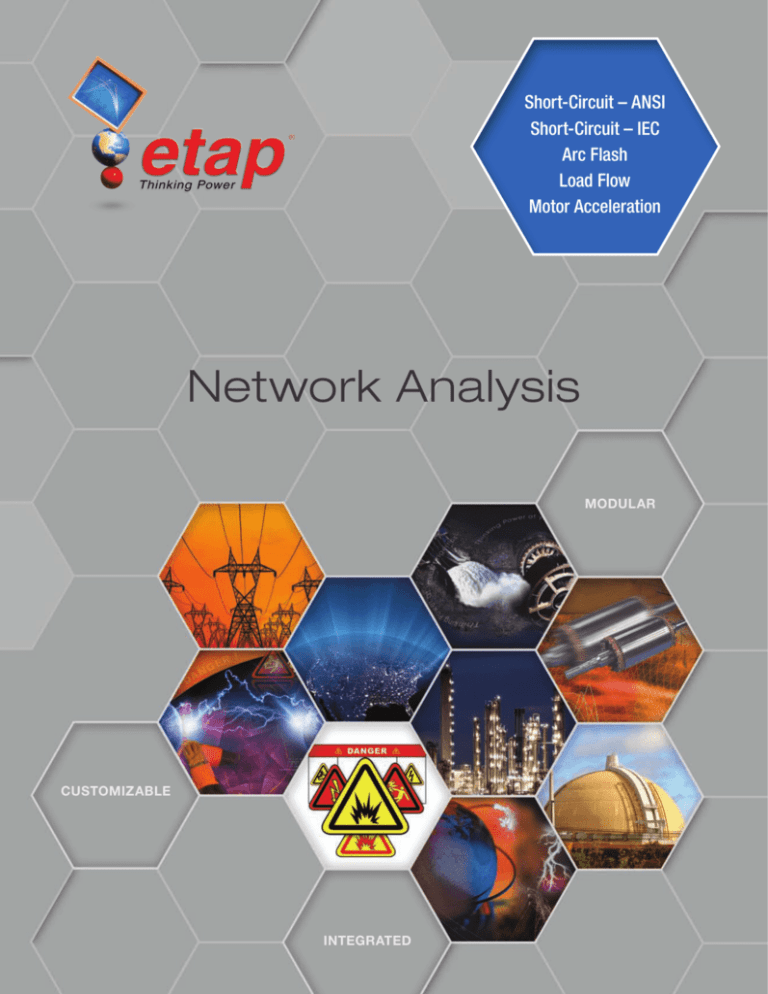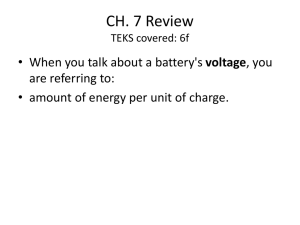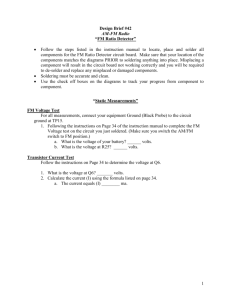
Short-Circuit – ANSI
Short-Circuit – IEC
Arc Flash
Load Flow
Motor Acceleration
Network Analysis
MODULAR
CUSTOMIZABLE
INTEGRATED
Power System
Enterprise Solution
ETAP is the most comprehensive analysis platform for the design,
simulation, operation, control, optimization, and automation of
generation, transmission, distribution, and industrial power systems.
2
|
Customize ETAP to fit your needs,
from small to large power systems
ETAP Enterprise Suite provides one solution to your power system
design, analysis, and operation needs. ETAP offers a comprehensive
suite of analysis modules that can be configured to suit your specific
needs. This modular approach allows you to purchase only the
modules you need.
Dynamics
& Transients
Transient Stability
Generator Start-Up
Wind Turbine Generator
User-Defined Dynamic Model
Parameter Estimation
FEATURED IN THIS BROCHURE
Distribution
Unbalanced Load Flow
Optimal Power Flow
Transformer Tap Optimization
Switching Sequence Mgmt.
Reliability Assessment
Optimal Capacitor Placement
GIS Map
Transmission
Line
Line Constants
Line Ampacity
Sag & Tension
HV DC Transmission Link
Monitoring
& Simulation
Advanced Monitoring
Energy Accounting
Real-Time Simulation
Event Playback
Load Forecasting
STAR
Protective
Devices
Coordination & Selectivity
Sequence-of-Operation
Relay Test Set Interface
ARTTS
Relay Testing
& Simulation
Relay Test Set Equipment
ETAP Test Set Software
Energy
Management
System
Automatic Generation Control
Economic Dispatch
Supervisory Control
Interchange Scheduling
Reserve Management
Network
Analysis
Short-Circuit – ANSI
Short-Circuit – IEC
Arc Flash
Load Flow
Motor Acceleration
Cable Systems
Underground Thermal Analysis
Cable Pulling
Cable Ampacity
Cable Sizing
Power Quality
Harmonic Load Flow
Frequency Scan
Harmonic Filters
DC Systems
Load Flow
Short-Circuit
Control System Diagram
Battery Discharge
Battery Sizing
Ground Grid
Systems
Finite Element Method
IEEE 80 & 665 Methods
Panel Systems
Panels ANSI & IEC
Intelligent
Load Shedding
Load Preservation
Load Restoration
Load Shedding Validation
Intelligent
Substation
Substation Automation
Switching Management
Load Management
Data
Exchange
DataX
MS Access & Excel
CAD Interface
e-DPP Interface
SmartPlant Interface
Base
Package
Cable Ampacity & Sizing
Transmission Line Constants
Report Manager
Project Management Wizards
Output Report Comparator
Multi-D Database
Libraries
|
3
Short-Circuit ANSI & IEC
Instant Results, Comprehensive, Graphical Summary
As Easy as 1,
2, 3
Save hours of tedious hand calculations and take the guesswork out of short circuit studies by automating the process with
multiple calculation and result analysis tools within ETAP.
ANSI / IEEE Standards C37 & UL 489
IEC Standards 60909 & 61363
Automatic Device Evaluation for
3-Phase, 1-Phase, & Panel Systems
The Short-Circuit module makes it easy to go from selecting
elements from the comprehensive libraries of short circuit
current ratings to performing dozens of different types of short
circuit analysis with the purpose of finding the worst-case
device duty. Built-in intelligence allows it to automatically apply
all ANSI / IEEE or IEC factors and ratios required for high- and
low-voltage device duty evaluation. Determine fault currents
and automatically compare these values against manufacturer
short circuit current ratings. Overstressed device alarms are
automatically displayed on the one-line diagram and reports.
OTI closely monitors industry standards and OEM data to
ensure ETAP is always up-to-date. The Short-Circuit module
seamlessly integrates with device coordination and performs
arc flash hazard calculations.
Load Terminal Short Circuit Calculation
Display Critical & Marginal Alerts
Integrates with Star Protective Device
Coordination
Seamless Transition to Arc Flash
Alert View: Easily view marginal and
critical alerts
4
|
Device Duty Calculation & Evaluation
for Single & Multiple-Phase Systems,
Panel, & UPS
Capabilities
• Automatic 3-phase device evaluation
• Device evaluation based on total or maximum
through fault current
ANSI and IEC standards are used for calculating short circuit
current for parts of the network below main panels, subpanels,
UPS, and phase adapters. Device duty calculation compares
the calculated fault current from these networks for evaluation
of protective devices and automatically generates critical and
marginal alerts based on user-defined alarm limits.
• Automatically adjust conductor resistance & length
(both lines & cables)
Multi-Phase Systems
• Global or individual device impedance tolerance
adjustments for maximum & minimum fault currents
• Include / exclude fault impedance modeling for
unbalanced faults
• Include / exclude shunt admittance for branches &
capacitive loads (unbalanced faults)
• Graphical or tabular bus fault selections
• Automatically determine fault currents at motor
terminals without the need to add additional buses
• Phase-shifting transformers
UPS Systems
• Grounding models for generators, transformers,
motors, & other loads
• Motor contribution based on loading category,
demand factor, or both
• Extract manufacturer published data from the
libraries for thousands of devices
Panel Systems
Short-Circuit ANSI & IEC
|
5
ANSI / IEEE Standards
Features
Standards
• 1-phase & panel systems device evaluation
IEEE C37.04
Standard Rating Structure for AC High-Voltage Circuit Breakers
Rated on a Symmetrical Current including Supplements:
IEEE C37.04f, IEEE C37.04g, IEEE C37.04h, IEEE C37.04i
IEEE C37.010
Standard Application Guide for AC High-Voltage Circuit
Breakers Rated on a Symmetrical Current
IEEE C37.010b
Standard and Emergency Load Current-Carrying Capability
IEEE C37.010e
Supplement to IEEE C37.010
IEEE C37.13
Standard for Low-Voltage AC Power Circuit Breakers Used
in Enclosures
• Evaluate symmetrical or total rated circuit breakers
IEEE C37.013
• Special handling of generator circuit breakers for
system & generator faults
Standard for AC High-Voltage Generator Circuit Breakers
Rated on a Symmetrical Current Basis
IEEE C37.20.1
Standard for Metal Enclosed Low-Voltage Power Circuit
Breaker Switchgear
• Interrupting duty as a function breaker contact
parting time
IEEE 399
Power System Analysis – the Brown Book
IEEE 141
Electric Power Distribution for Industrial Plants – the Red Book
• Standard & user-definable contact parting time
IEEE 242
IEEE Recommended Practice for Protection and Coordination
of Industrial and Commercial Power Systems – the Buff Book
UL 489_9
Standard for Safety for Molded-Case Circuit Breakers,
Molded-Case Switches, and Circuit Breaker Enclosures
• Determine maximum & minimum short circuit fault
currents
• Calculate ½ cycle, 1.5–4, & 30 cycle balanced
& unbalanced faults (3-phase, L-G, L-L, L-L-G)
• Check momentary & interrupting device capabilities
• Check closing & latching capabilities
• Automatically includes No AC Decay (NACD) ratio
• User options for automatic adjustment of HVCB rating
Reporting (ANSI & IEC)
• Load terminal fault current reporting
• Automatically flag marginal & critical overstressed devices
• Individual fault current contributions for Isym, Ia, & 3I0
• Phase & sequence voltage profiles (Va, Vb, Vc, V1, V2, & V0)
• Phase & sequence current profiles (Ia, Ib, Ic, I1, I2, & I0)
• Phase & sequence impedances
• Alert view to display critical & marginal limit violations
Reporting: Load terminal fault current reporting
• Export one-lines with short circuit results to third party CAD applications
• Input data, detailed individual & total short circuit contributions, & summaries
• Enhanced state-of-the-art graphic display of results for balanced & unbalanced faults
• Export output reports to your favorite word processor or spreadsheet
• Full color customizable Crystal Report® viewers
6
|
IEC Standards
Features
Standards
• 1-pole / 2-pole short circuit device duty for 1-phase
panel / UPS systems
IEC 62271-100
High-Voltage Switchgear and Controlgear,
Part 100:High-Voltage Alternating-Current Circuit Breakers
• Unbalanced L-G, L-L, & L-L-G faults analysis
IEC 62271-200
High-Voltage Switchgear and Controlgear, Part 200: AC
Metal-Enclosed Switchgear and Controlgear for Rated
Voltages Above 1 kV and up to and including 52 kV
• Compares device ratings with calculated short
circuit values
IEC 62271-203
High-Voltage Switchgear and Controlgear,
Part 203: Gas-Insulated Metal-Enclosed Switchgear for
Rated Voltages Above 52 kV
• User-definable voltage C factor
IEC 60282-2
High-Voltage Fuses, Part 2: Expulsion Fuses
• Service or ultimate short circuit current ratings for
LVCB breaking capability
IEC 60909-0
Short Circuit Currents in Three-Phase AC Systems, Part 0:
Calculation of Currents (including 2002 Corrigendum 1)
IEC 60909-1
Short Circuit Currents in Three-Phase AC Systems,
Part 1: Factors for the Calculation of Short Circuit Currents
According to IEC 60909-0
• Phase-shifting transformers
IEC 60909-2
• Negative or positive impedance adjustments for
max/min I˝ k & Ik
Electrical Equipment – Data for Short Circuit Current
Calculations in Accordance with IEC 909 (1988)
IEC 60909-4
Short Circuit Currents in Three-Phase AC Systems, Part 4:
Examples for the Calculation of Short Circuit Currents
• Automatic application of K correction factors
(i.e., KT, KG, KSO)
IEC 60947-1
Low Voltage Switchgear and Controlgear,
Part 1: General Rules
• Automatically determines meshed & non-meshed
networks for calculating Ib, Ik, & Idc
IEC 60947-2
Low Voltage Switchgear and Controlgear,
Part 2: Circuit Breakers
IEC 61363-1
Electrical Installations of Ships and Mobile and Fixed
Offshore Units, Part 1: Procedures for Calculating Short
Circuit Currents in Three-Phase AC
• Transient IEC 61363 short circuit calculations
• User-definable R/X adjustment methods for Ip
(method A, B, or C)
• Ib for meshed network is adjusted by individual machine
contributions for improved accuracy
• Considers both near & far from generator short circuits
• Generates relay test set compatible plots for transient
short circuits
• Detailed IEC device duty reports & complete
contributions for unbalanced faults
Fault Current Waveform
Short-Circuit ANSI & IEC
|
7
Arc Flash Analysis
Reduce Risk, Improve Safety, Enforce Compliance
Industry Leader in Comprehensive
Arc Flash Solutions
ETAP Arc Flash Analysis brings you new and enhanced
capabilities which allow for faster and easier performance of
arc flash hazard analysis. Identify and analyze high risk arc
flash areas in your electrical system with greater flexibility by
simulating various incident energy mitigation methods.
Arc Flash is a completely integrated module that solves
multiple scenarios to determine worst-case incident energy
levels. It also produces professional reports and high quality
arc flash labels at the press of a button.
IEEE 1584a 2004
NFPA 70E 2000 & 2004
Enclosed & Open Air Equipment
Arc Flash Calculations
Integrated with ETAP Short-Circuit
Integrated with ETAP Star Protective
Device Coordination
One-Line Diagram: TCC and arc flash results
8
|
Most Capable & User-Friendly Arc Flash
Hazard Assessment Solution
Automated Analysis
• Automatically determine the Arcing Fault Clearing Time
• Instant determination of the flash protection, prohibited,
restricted, & limited approach boundaries according
to NFPA 70E
• Determine individual arcing current contributions
• Generate arc flash labels for every incoming main circuit
breaker cubicle, load circuit breaker, & motor starter
bucket
• Generate arc flash labels for every load terminal point
including induction motors, synchronous motors, capacitor
banks, & static loads
IEEE & NFPA Features
The following capabilities are available to comply with
IEEE and NFPA guidelines:
• Limit the incident energy based on maximum fault
clearing time (e.g., two seconds)
• Built-in empirical equation range limits alerts &
grounding configurations
• Automatically distinguish between load & line side
protective devices
One-Line Diagram to Reports to Labels: Calculate arc flash results at multiple
locations automatically
Simple Operation
• Run multiple arc flash simulations with one-click &
analyze all of the different results in minutes
• Define your own parameters or use system-calculated
results to determine the incident energy
• User-definable & typical IEEE Equipment Gap between
conductors for buses & X-factors (based on IEEE 1584)
• Automatically handle Incident Energy calculation for LV
buses (e.g., 208 volts) fed by transformers rated less than
125 kVA
• Automatically assign hazard category for LV (<240 volts)
with bolted current less than 10 kA
• Use the Quick Incident Energy Calculator to analyze
“what if” scenarios at every bus
Arc Flash Analysis
|
9
Comprehensive Arc Flash Safety Program
Generator Decrement Curve
Capabilities
• Consider Generator AC Decay & Decrement Curve
automatically for individual synchronous generators
• Consider AC Motor short-circuit current decay
• Time varying fault clearing time calculation based on
system bolted SC current decay
Motor Decay
• Perform arc flash calculations for both 3-phase &
1-phase panel / UPS systems
• Handle radial & multiple source system
• Extended search of several levels past the point of
multiple upstream source contributions
• Use automatic or user-defined source protective
device search algorithm
• Modeling of differential relays, maintenance mode
switches, & arc flash light sensors
• Capable of modeling Zone Selective Interlock
Protection (ZSIP)
Maintenance Mode
Arc Flash Result Analyzer
• Comprehensive library of overcurrent devices (fuses,
LVCB, in-line relays, MCPs, OLRs, etc.)
ETAP Arc Flash has a very powerful calculation result analysis tool which helps to quickly identify high risk areas.
• Sort results from different studies by multiple
criteria
• Find the worst-case incident energy results
• Quickly isolate & identify AF mis-coordination
• Find which protective devices failed to operate
• Filter out & analyze only the higher hazard
category results
• Filter out all equipment with % Ia variation
problems
• Locate slow responding protective devices
• Export customized AF results to Excel reports
• Analyze the results in Metric or English units
• Color code & filter results by category
10
|
Work Permits, Data Sheets, Labels, . . .
• Customizable energized electrical work permits
• Custom data sheets to communicate arc flash study
parameters
• User-interface for defining hazard categories (NFPA
70E 2000 & 2004) or customize based on your
safety program requirements
• Generate IEEE 1584 & NFPA 70E look-up table
results for different working distances & generate
simple summary reports to communicate the results
to personnel
• Alerts for PPE ATPV rating violations (maximum
allowable PPE arc rating alerts)
• Find the safest mode of operation for maintenance
work
• Automatically batch print arc flash labels based on
highest incident energy from all operating modes
Reporting
• Calculated results are displayed automatically on the
one-line diagram
• Printing of ANSI Z535 arc flash label templates
with user-defined text fields / PPE requirements /
disclaimers
• Print assorted sizes (4"x 6", 4"x 4", 3"x 3") of arc
flash labels to Brady® Label printers or DuraLabel®
Pro printers
• Print arc flash labels to Avery Permanent Durable
ID templates
®
Multiple Language Arc Flash Labels: Automatically
generate and print arc flash labels in English, Spanish,
Portuguese, and more
Label Printer Support: ETAP supports
different label printers including Brady ®
Label and DuraLabel ® Pro and high
quality material Avery ® Labels
• Print labels in multiple languages, such as Spanish,
Portuguese, & French
• Plot incident energy vs. time & arcing current in Star
(for coordination)
• MS Excel reports for bus & individual protective device
arc flash analysis results
• Hundreds of customizable arc flash label templates are
available
Arc Flash Analysis
|
11
Load Flow Analysis
One Program, One Database, One Solution
Create & Validate System
Models with Ease & Accuracy
With ETAP’s advanced Load Flow module, you can create
and validate your system model with ease and obtain
accurate and reliable results. Built-in features like automatic
device evaluation, summary alarms / warnings, result analyzer,
and intelligent graphics make it the most efficient Load Flow
program available today.
Voltage Drop
Power Factor Correction
ETAP calculates bus voltages, branch power factors, currents,
and power flows throughout the electrical system. ETAP
allows for swing, voltage regulated, and unregulated power
sources with multiple power grids and generator connections.
It is capable of performing analysis on both radial and loop
systems. ETAP allows you to select from several different
methods in order to achieve the best calculation efficiency
and accuracy.
Automatic Device Evaluation
Automatic Temperature Correction
2W & 3W Transformer LTC / Regulator Actions
Real & Reactive Power Losses
Extensive Violation Alerts
Multi-Report Result Analyzer
Intelligent Graphics: State-of-the-art graphical display of results including
voltage drop, load terminal voltage, branch losses, and transformer LTC settings
12
|
Most Efficient Load Flow Program Available
Study Options
• Option to update initial conditions
• Phase-shifting transformers
• Auto-adjust LTC / regulator settings
• Power factor correction
• Saves solution control parameters for each scenario
• Make changes to your system & re-run studies instantly
• Conduct unlimited “what if” studies within one database
• Calculate bus voltages, currents, & power factors
• Bus / transformer / cable reactor overload warnings
• Calculate power flows
• Update loading for DC load flow
• Voltage drop calculations
3-Phase and 1-Phase Power Flow: Calculate power flow for 3-phase, 1-phase,
panel, and UPS systems simultaneously
• Five levels of automatic error checking
Capabilities
Flexible Operation
• Simulate multiple loading & generation conditions
• Diverse operating conditions
• Automatically adjust transformer tap & LTC / regulator
settings
• Multiple loading categories
• User-controlled convergence parameters
• Different model of lumped loading
• Compare & analyze multiple reports using result
analyzer
• Unlimited configurations
• Include effect of phase-shifting transformers
• View results graphically
• Multiple demand factors
• Different nameplate data
• Global & individual bus diversity factors
• Evaluate critical & marginal limit violations
• Solve 3-phase & 1-phase system load flow
simultaneously
Automatic Device Evaluation: Automatically generate critical and marginal
alerts for overstressed 3-phase and 1-phase systems
Load Flow Analysis
|
13
Simultaneous Analysis of Different Scenarios
Load Flow Result Analyzer
ETAP Load Flow Result Analyzer is a timesaving tool that compares and analyzes
multiple reports in a single view. You can
compare the results of general information
about a project or more specific information
such as the load flow results for buses,
branches, loads, or sources.
• Understand results of multiple studies in one glance
• Compare & view multiple load flow results in a single view
• Analyze & compare reports from multiple projects
• Create a base line report & quickly identify deviations for all cases
• View multiple bus, branch, load, & source results
• Advanced alert & warning feature identifies & highlights overstressed components
• Easily find components on one-line diagrams from the analyzer view
• Export summary view into Microsoft® Excel for maximum data flexibility & visualization
14
|
Detailed Modeling with Accurate Results
Features
• Newton-Raphson, fast decoupled, & accelerated
Gauss Seidel
• Generator governors with isochronous or droop mode
• Generator exciters with AVR or Mvar / PF controllers
• Transformer load tap changers (LTC / regulators)
• Advanced solution techniques for fast convergence
• Multiple loading conditions
• Multiple generation conditions
• Swing, voltage regulated, & unregulated power sources
• Voltage drop calculations
• Load forecasting
• Alert view to display critical & marginal limit violations
• Bus / transformer / cable overload warning
• Single-phase load flow display
• Global & individual bus diversity factors
Extensive Reporting: Detailed load flow reports and
indispensable summaries including branch losses, voltage
drop, and loading
Reporting
• State-of-the-art graphic display of results
• Customize output reports using Crystal Reports®
• Generate output reports in any language
• Voltage drops, losses, power flows, power factor, etc.
• Individual demand factors for continuous, intermittent,
& spare operating conditions
• Option to update the initial condition from load flow solutions
• Phase-shifting transformer
• Power factor correction
• Multi-report result analyzer
• 10,000+ bus capability
• Input data, detailed load flows, & summaries
• Export reports to your favorite word processing program
• Graphically display device evaluation results
• Graphically display buses with marginal or critical
under / over voltage
• Export one-line diagrams including results to third
party CAD systems
• Alert view to display critical & marginal limit violations
Load Flow Analysis
|
15
Motor Acceleration
Intuitive, Intelligent, Incomparable
Advanced Technology in
Motor Evaluation & Simulation
The Motor Acceleration module enables engineers to
thoroughly evaluate the impact of load changes to electric
power systems. Motor Acceleration is fully capable of
starting one motor or transitioning an entire power system
to another state. Sequence-start a series of machines using
static or dynamic models, operate Motor Operated Valves
(MOVs), and simulate the switching actions of Load Tap
Changers. Advanced plotting and time varying graphical
display enable engineers to quickly evaluate results and
make decisions.
Dynamic Motor Acceleration
Static Motor Starting
Voltage Flicker
Motor & Load Dynamic Models
Conventional & Soft Starting Devices
Multi-Sequence Starting
Load & Generation Transitioning
Comprehensive Alarm & Warning
Motor Operated Valve (MOV) Simulation
Accelerate Multiple Motors: Start multiple motors using unlimited sequence of events
16
|
Quickly Evaluate Results & Make Decisions
Comprehensive Modeling
• No voltage or system connection limitations
• Induction / synchronous motor dynamic models
• Typical & user-defined load models
• Global or individual LTC time delays
• Transformer phase shift
• Starting devices: auto-transformer, capacitor,
rotor / stator R or X, Y/D, partial winding, etc.
• Voltage, current, or torque controlled soft starters
• Five levels of automatic error checking
Motor Starting Time Slider: View time domain results graphically
Capabilities
• Accelerate / stop multiple motors
• Dynamically model motors & loads
• Create unlimited sequence of events
• Compare the response from various motor starters
• Simulate load ramping of starting motor
• Transition loading of entire system
• Vary generator / grid operating parameters
• Visualize results with extensive alerts & warnings
Dynamic Modeling: Complete modeling of machines and connected load
• Simulate transformer LTCs / voltage regulators
• Simulate MOVs with five operating stages
Motor Acceleration
|
17
Reporting
• Graphical display of time-varying results
• Auto-alert abnormal conditions with marginal or
critical levels
• Graphically display buses with marginal or critical
voltage levels
• Comprehensive plots with operation details
• Export one-line diagrams including results to third
party CAD systems
• Export to your favorite word processing program
User-Defined Alerts: Automatically flag marginal and overstressed
devices
Automatic Result Validation / Alert
• Motor start failure
• Under-voltage for starting motor / MOV
• Under-voltage buses per bus type & voltage level
• Overloaded generator & prime mover
• User-defined marginal & critical alert limits
Libraries & Models
• Double-cage (dependent circuit)
• Double-cage (independent circuit)
• Single-cage (without deep-bar)
• Single-cage (deep-bar)
• Characteristic motor model
Comprehensive Reporting: Customizable output reports using Crystal Reports ®
• Polynomial & characteristic load models
Realistic Operation: Simulate load and generation transitioning
18
|
Comprehensive & Reliable Tools for
System Analysis
Features
• Multiple motor / load acceleration / stop & sequencing
• Switch on / off static loads & capacitors
• Open / close MOVs with five operating stages
• Include transformer LTC / voltage regulator action
• Generator / grid operating parameters & load profiles
• Multiple loading conditions & generation levels
• Different loading categories for pre-start conditions
• Motor load ramping
• Group actions
• Individual actions
• Start / stop by group
• Group start globally or by individual bus
Flexible Plots: View results as individual or combined plots
• Start, stop, & restart in a single run
• Fast bus transfer using load transitioning
• Unlimited actions in each event
Plots
• Motor
• Terminal / bus voltage
• MOV
• Torque
• Static Load
• Electrical power
• Capacitor
• Mechanical power
• Generator
• Current
• Bus
• Generator / grid current,
power, & power factor
• Slip (speed)
Customized Results
• Unlimited events in one simulation
• Unlimited simulations stored in study cases
• Change & rerun studies instantly
• Motor nameplate library
• Motor circuit model library
• Motor characteristic model library
• Polynomial based load model library
• Curve based load model library
• Integrated with motor parameter estimation
• Automatic alert & warnings
• Include multiple axes
• Simulate motor starters including soft-starters
• Display multiple motors simultaneously
• Comprehensive & flexible plots & reporting
• Zoom to any detail
• Execute multiple preset simulations at one-click
with Study Wizard
• Export data to Microsoft® Excel
• Change text & axes
• Line, bar, 3-D, & scatter plots
Motor Acceleration
|
19
etap.com
Quality Assurance Commitment
ETAP is Verified and Validated (V&V) against field results, real system measurements, established programs, and hand calculations to ensure its technical accuracy.
Each release of ETAP undergoes a complete V&V process using thousands of test cases for each and every calculation module. ETAP Quality Assurance program is
specifically dedicated to meeting the requirements of:
ISO 9001:2000
10 CFR 21
ASME NQA-1
CAN/CSA-Q396.1.2
10 CFR 50 Appendix B
ANSI/ASME N45.2
ANSI/IEEE 730.1
ANSI N45.22
© 2008 Operation Technology, Inc. All rights reserved. Certain names and/or logos used in this document may constitute trademarks, service marks, or trade names of Operation Technology, Inc.
Other brand and product names are trademarks of their respective holders.
Operation Technology, Inc. | 17 Goodyear, Suite 100 | Irvine, CA 92618 | T 800.477.ETAP | T 949.462.0100 | F 949.462.0200 | info@etap.com







